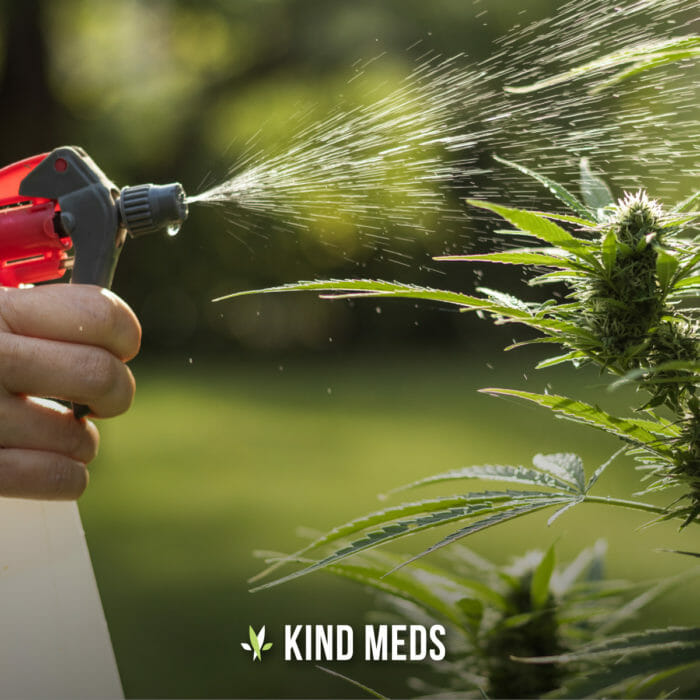Importance of Chemical- and Pesticide-Free Medical Marijuana for Patients
Written by Chris Weatherall on Oct 15, 2018Why Patients Need Access to Pesticide-Free Marijuana
Marijuana laws have evolved significantly over the past few decades, with many states allowing adults to purchase and consume marijuana for medical use, recreation or both. Still, there are many gray areas throughout the country concerning marijuana’s federal status as a Schedule I controlled substance and the availability of some medical marijuana products in certain states. Similarly, a pervasive issue facing all marijuana users throughout the country is the use of pesticides on marijuana crops.
Lack of Assurance that Medical Marijuana Products Are Pesticide Free
While there is still no way to truly control and regulate the illegal marijuana industry in the U.S., many of the states that have adopted medical cannabis legalization and/or recreational marijuana laws have also enacted standards for stakeholders in the marijuana industry. Growers, product manufacturers, distributors and dispensaries must all meet specific state-level regulations.
However, at this time, only a few states have specific laws in place concerning the use of pesticides on marijuana crops.
An individual who purchases marijuana illegally on the street has virtually no guarantee as to the quality or safety of the product. A purchase from a medical marijuana dispensary should come with some degree of security, and that is why it is essential for medical marijuana users to do thorough research on the types of marijuana and marijuana products they buy and consume.
Pesticide-Related Health Problems
Pesticides play a role in many agricultural sectors and primarily exist to kill destructive pests and fungi. Like any other plant, marijuana is vulnerable to different types of fungus and damage or diseases stemming from pest infestations.
Therefore, some measure of pest control is usually necessary to consistently grow a high-quality product. The United States Environmental Protection Agency (EPA) has recognized several medical conditions that may develop in humans due to pesticide exposure.
Pesticide health effects vary widely based on:
- The type of pesticide
- The toxicity of the pesticide
- The amount of exposure a person received
For example, a small amount of exposure to a very toxic pesticide could produce a similar effect to consistent exposure over a long time to a less-toxic pesticide.
Some pesticides irritate the skin and eyes, while others cause respiratory problems. Still others may interfere with the body’s endocrine, or hormone, systems.
While direct pesticide exposure is the most dangerous, there is also a chance of contracting pesticide-related health issues by consuming products made with pesticide-tainted raw materials.
Modern Pesticide Use on Marijuana Crops
 Legal growers of marijuana for recreational or medical sale must abide by all state and local laws and ordinances concerning zoning, product handling and pesticide use, if applicable.
Legal growers of marijuana for recreational or medical sale must abide by all state and local laws and ordinances concerning zoning, product handling and pesticide use, if applicable.
If there are no specific pesticide-related laws in place, then marijuana farmers are essentially free to use whatever pest control methods they prefer. There is no onus to report pesticide use to consumers or test them before sale. Even some “all natural” pesticides can cause serious health problems, and most organic pesticides are acceptable for use, unless state law specifies otherwise.
There is also uncertainty surrounding marijuana’s status as a crop. It may qualify as either a medical drug crop or an agricultural crop, or possibly both, so there is no firm way to discern which regulations apply to which crops in different states.
Generally, there are federal- and state-level regulations for acceptable pesticides on specific crops. Marijuana growers worry about the safety and efficacy of their crops, so they have lobbied for pesticide approval in several states.
It’s difficult to strike a balance in pest control methods that prevent mold, fungus and pest infestations without harming the crops themselves or posing a health risk to end users.
Effects of Pesticides on Marijuana
States including Washington, Colorado and Oregon have uncovered an unsettling trend of alarming levels of pesticides in cannabis products, including marijuana flower. Some companies, including the Wellness Connection in Maine and TruCannabis in Colorado, have faced legal penalties for pesticide use or had to issue recalls on pesticide-contaminated cannabis products.
Medical marijuana users consume cannabis in a variety of ways. While some smoke it in traditional fashion, others use vaporizers to consume the flower, while others purchase edibles, drinks, tinctures and even topical creams.
Pesticides will persist through most refining processes, so it’s very likely that a marijuana plant exposed to pesticides while still growing will carry trace amounts into the final product. Different pesticides can cause various medical issues; the method and frequency of use by the patient are important factors as well.
While a one-time dose of cannabis tainted with pesticides may not be fatal or even cause a noticeable reaction, most people who use medical marijuana use it on a regular basis, even every day. Over time, pesticide use in marijuana crops can cause several health issues, and the results can vary from person to person.
Legislation Concerning Pesticide Use on Marijuana Crops
The states that have adopted medical and recreational marijuana laws have recognized the issue of pesticide use in several ways. Some states only allow organic pesticides, while others allow the use of pesticides approved for other crops. A few states – such as Rhode Island, Michigan, Hawaii and Alaska – do not have any specific pesticide regulations in place for cannabis crops at this time.
This is an important issue because as more states adopt medical marijuana and recreational marijuana policies, the consumer base will undoubtedly grow…and so will the demand for customers to have the ability to make informed purchasing decisions.
Take Charge and Do Your Research
Since marijuana legislation is apparently slow to catch up to changing trends and markets, the consumer should know how to research cannabis products and dispensaries. This research will help them identify trustworthy cannabis suppliers and product manufacturers.
Third-Party Certification
Many third-party certification agencies use rigorous testing standards to report on the quality of the products they review, and this can include cannabis products. This applies to “organic” products, as well. Why? It’s essential to know what standards the producer used to claim the product is organic and whether the producer faithfully adhered to those standards.
It’s easy for a grower to claim a product is organic cannabis, but it may be difficult to prove such a claim without any firm regulations for testing requirements. Third-party certification agencies can also report on which testing standards a cannabis grower or product manufacturer uses.
Ideally, cannabis manufacturing and distribution will follow a similar path as that of the organic food movement in recent years. This begins with third-party testing and independent agencies working state by state toward legislation at the national level.
Eventually, the United States Department of Agriculture should adopt clear standards for cannabis production, but marijuana’s Schedule I classification remains a roadblock.
Avoiding Marijuana Tainted With Pesticides
If you want to be sure you’re purchasing pesticide-free marijuana, it’s a very good idea to speak with dispensary owners or “budtenders” before purchasing any cannabis products. Once you can identify distributors, growers and product manufacturers, do some research to find out whether these entities abide by required state and local marijuana regulations and pesticide laws.
If you’re unsure about a purchase or can’t find any information about a new cannabis product, it may be best to avoid purchasing the product until you can find some kind of third-party certification of its quality and safety.
Learn More About the Health and Safety Issues of Pesticides
Any medical marijuana user should not only become familiar with the strains and products that will be most beneficial for one’s own medical conditions, but should also have a firm understanding of the quality standards in place to protect medical marijuana customers.
If you’re interested in learning more about the state and federal laws in place regarding medical cannabis, we have created an extensive online resource to aid your research!
Learn More: Arizona Cannabis Legalization & Medical Marijuana Laws








